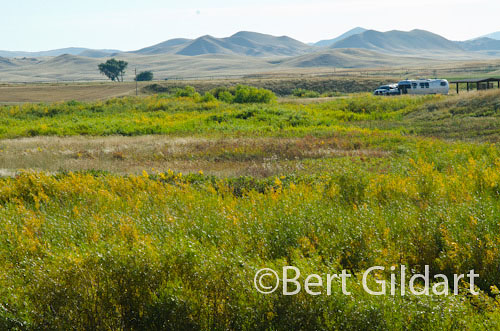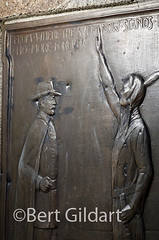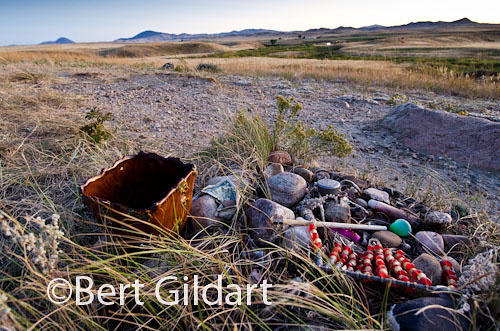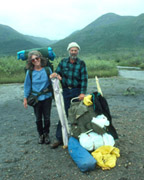Bear Paw Battlefield Helps Amend Tragic Policy
©Bert Gildart: Seasons vary dramatically from year to year, and for the past few days we’ve been enjoying weather that is like that of a mid July day. On this late September day, temperatures peaked at 93 and we parked (not camped — mind you) our Airstream so that we could take advantage of the night skies — cleared with the NPS before pulling in. Soon coyotes began to howl and the stars came out adding a feeling of euphoria to the Bear Paw Battlefield, located just south of Chinook, Montana.
How these conditions contrasted with those about 130 years ago when Chief Joseph and his band sought a temporary reprieve from U.S. troops who had chased them for over 1,500 miles. When Joseph, Looking Glass and other significant war chiefs fought here in yet another defensive battle, snow fell and temperatures dipped to well below freezing. Hundreds of women and children in the many Nez Perce families suffered and did so in ways that proved deadly.
SOLIDERS FEARED ANOTHER DEFEAT
The battle occurred in early October of 1877 and commenced when Colonel Miles rode in from the east. The Nez Perce thought they were days ahead of the troops, but Miles had been alerted of the band’s position, and he intercepted Joseph. Nevertheless, the warriors rose up, and turned the charge, just as they had done repeatedly over the past few months.
Fearing a defeat such as Custer experienced, Miles retreated and then regrouped, And then he positioned his deadly Hotchkiss gun and began to fire. Almost immediately two women were killed when the cave in which they’d hoped to find safety collapsed.
Colonel Miles and General Howard continued their assault, and though the Nez Perce fought hard, attrition finally began to mount, and on the afternoon of October 5, 1877, Joseph asked to surrender to Miles, despite the fact that he and his band were just 50 miles from the Canadian border — and freedom. His subsequent words are famous and have been quoted throughout history.
Chief Joseph began by describing the suffering of the children, and then concluded by surrendering his rifle and asking that the opposing soldiers hear him. It has been called one of the most beautiful speeches of surrender ever made:
Tell General Howard I know his heart. What he told me before I have in my heart. I am tired of fighting. Our chiefs are killed. Looking Glass is dead. Toohoolhoolzote is dead. The old men are dead. It is the young men who say yes or no. The old men are all dead. It is cold and we have no blankets. The little children are freezing to death. My people, some of them, have run away to the hills, and have no blankets, no food; no one knows where they are – perhaps freezing to death. I want to have time to look for my children and see how many I can find. Maybe I shall find them among the dead. Hear me, my chiefs, I am tired; my heart is sick and sad. From where the sun now stands, I will fight no more forever.
“FOR JOSEPH CONDITIONS ONLY GOT WORSE”
As Janie and I walked the battlefield trail we were joined by Park Historian Stephanie Martin, who told us that after the surrender conditions for Joseph “only got worse.” Though Miles had promised the Nez Perce that he would return them to their homeland in Idaho, the government countered the wishes of both General Howard and Colonel Miles. Instead, Congress shipped the band to Fort Leavenworth in cattle cars. Here, disease and weather killed the infants and then settlers dug up the bodies and fed them to their hogs. “It was,” said Martin, “one of the worst cases of man’s inhumanity to man.”
Today, when visitors hike the one and a half mile loop, they can see the site where Chief Looking Glass was killed and where Joseph actually surrendered to Miles. But they see a more compassionate side of humanity as well. At various and significant spots along the route, visitors have left offerings that might include tobacco, coins… a dollar bill, the shell of a grouse, beads, or perhaps a smooth rock that Martin says is most likely from Idaho’s Salmon River country.
The offerings and serenity of the season made us feel as though Joseph had actually found the freedom he had struggled so hard to achieve. How easy it was to believe that on a warm fall day — and on a night when stars filled the night sky — that all was well. Other than the yip of coyotes, the silence that engulfed us inside our Airstream was absolute.
—————————————






September 29th, 2011 at 9:13 pm
Chief Joseph’s is one of the saddest stories…